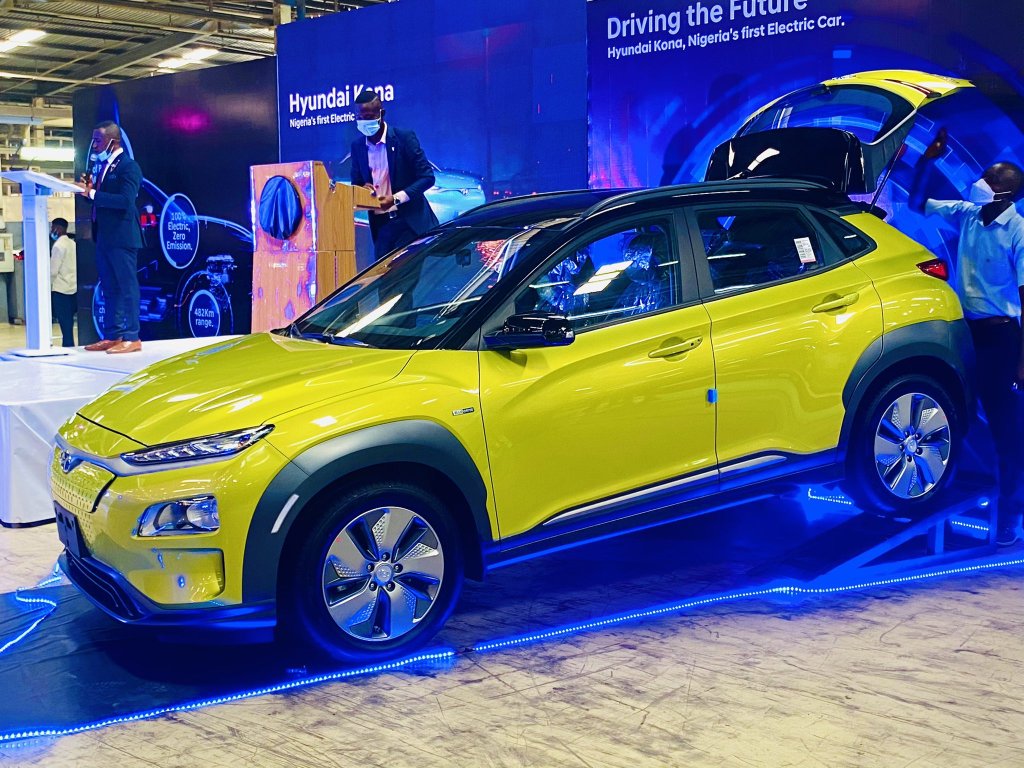Hyundai Kona EV, Nigeria’s First Electric Car was launched at the Stallion-VON Automobiles Nig. LTD, at Ojo, Lagos, the place where the vehicle is getting assembled.
Lagos Governor Sanwo-Olu commended Stallion Group for the noble initiative and said the administration will make provisions for electricity charging points across the state to recharge their battery-powered vehicles.
The Kona comes with a 5 years of battery warranty and 5 years of vehicle warranty the assembling company says. It has starting price of 60,000 USD, approx. Seems the EV is being built with a 62 kWh battery version with a driving range of 482 km with an acceleration of (0-100kms) in 9.7 secs.

“KONA Electric will change the way people think about going electric. It would make history as the first EV in Nigeria with local manufacturing.” the Stallion Von group officials said. Hyundai Kona EV will be the first all-electric SUV in Nigeria, as well as Nigeria’s first locally-made electric car. Stallion Motors, Nigeria’s leading auto assembler and a franchisee of nine global brands.
Global Production
Kona currently gets assembled in four places worldwide namely South Korea: Ulsan, China: Beijing (Beijing Hyundai), Czech Republic: Nošovice, and Algeria: Tiaret (TMC Group). Lagos, Nigeria will be the fifth according to publicly available info.
The Kona is named after the western district of the island of Hawaii.
The car is sold in Portugal as the Hyundai Kauai, as Kona is too similar to Cona, the taboo slang word for the female genitalia in Portuguese. Like Kona, Kauai is a place in Hawaii. It is also Hawaiian for lady. In Spain, however, the car keeps its original name, although in Galician—language intimately related to Portuguese, spoken in the northwestern end of Spain—the word Cona has the same taboo connotation. In China, the car is sold as the Hyundai Encino.
Stallion Group plans assembling 5,000 Kona’s a year, they are with ambitious plans to increase production along with the demand for EVs.

Nigerian Automotive Production
The automotive industry in Nigeria dates back to the 1950s and consists of the production of passenger cars and commercial trucks. Early production was led by the assembly line of Bedford TJ trucks made by United Africa Company’s subsidiary, Federated Motors Industries, and SCOA’s production of Peugeot 404 pickup trucks.
The companies simply assembled kits and completely knocked down parts imported from abroad. In the marketplace, demand was largely dictated by the government’s budgetary concerns. Towards the end of the 1980s the industry was negatively affected by a downturn in the economy, the government’s inconsistency and the higher cost of locally manufactured cars compared to imported counterparts. By 2000, used foreign cars dominated car sales in the country, and the rise of these affordable used cars negatively impacted the development of backward integration in the industry.
Some of the plants had been privatized, VON was sold to Stallion Group and Leyland was sold to Busan. Production has been scaled down from the heights of the 1980s.
Since the beginning of democratic governance in 1999, the government has been selling its equity stake in the assembly plants. Volkswagen was sold to the Stallion Group, PAN’s stake was bought by ASD Motors. PAN, Stallion and local brand Innoson are the major local assembly plants in the country but Stallion mostly assembles partially knocked down parts. Innoson was commissioned in 2010 with an installed capacity of 10,000 vehicles a year, in 2015, the planned production target was 6,000 vehicles. in 2009, PAN started a new production line switching from 406 to 307 models. (Source Wikipedia)
